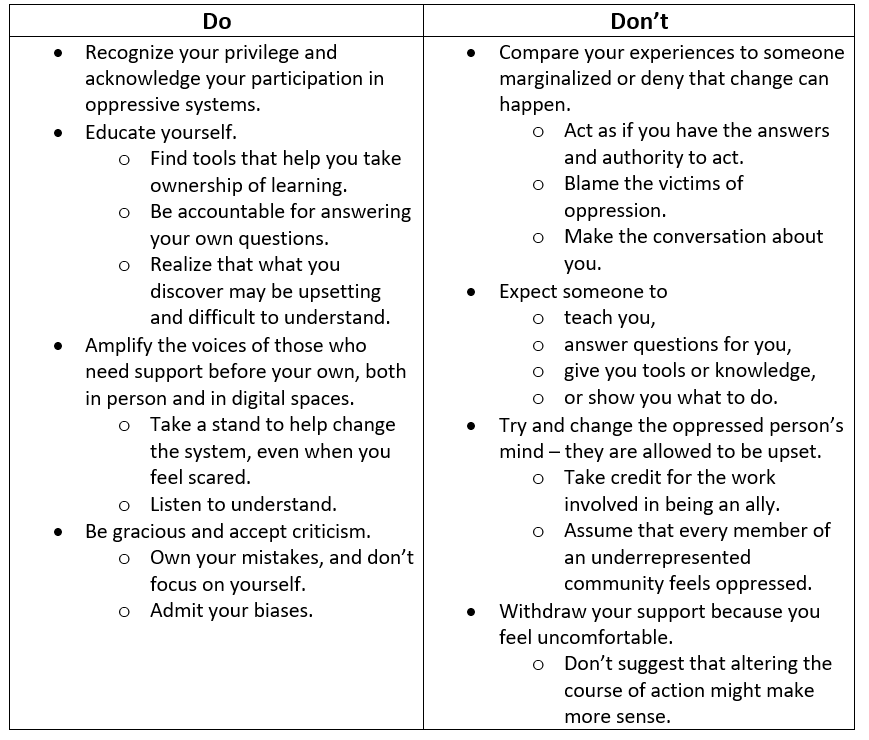How to be an Ally
Being an ally is about far more than making a declaration. It’s a conscious, educated decision that leads someone to develop sincerity, focus on introspection, and learn about consistency.
True allies show solidarity for people whose circumstances are different and challenging. There should never be any expectation of recognition or gratitude. An ally must understand this and embrace it. Embracing allyship helps you realize how you live your life and can support earnest changes in behaviours in yourself and society that can contribute to shifts that chip away at injustices and inequities.
In this article, we will explore some of the fundamentals, clarifying what it means to make the personal decision to be an ally and why allies are necessary. We’ll also look at the actions allies can take to strengthen our workplaces and communities.
What is an ally?
An ally is someone who wants to partner with marginalized people in our society to help overturn oppression and inequities that center around topics such as race, cultural identity, gender, religion, sexual orientation, ability, and body type/appearance. Allies focus on standing up “for equal and fair treatment of people different from them” whose voices are underrepresented.[1]
Allies recognize that introducing consistency in their lives can result in solidarity with others because they approach things earnestly, knowing that the right kind of support can change behaviours and ideas. Allyship is most effective when it happens in the context of genuine relationships and everyday interactions.
A large component of being a successful ally is practicing self-awareness and self-accountability.
- An ally must acknowledge how their privilege has benefited them.
- They must be open to listening to understand and learn about the kinds of meaningful actions they can offer as a show of support for people lacking privileged advantages.
Another way to look at it is that an ally cares enough to make a conscious decision to support someone who is a member of a group that the ally is not a part of and who is having a negative experience in their life. They also recognize that allyship is not pity. When enough people decide to be allies, that’s the point where social and societal change begins to happen.
Allyship is only valuable if it’s consistent. It can also be contradictory if the ally enters a situation from a solutions-oriented perspective because they believe they know exactly how to fix a problem. The responsibility for learning about the challenges marginalized groups experience is not something for an ally to expect their marginalized contacts to offer. It’s up to the ally to seek accurate knowledge responsibly. An ally must self-educate consistently and without expecting recognition for their involvement.
Why are allies necessary?
We often adapt what we think, say, and do to blend in with the crowd. It can help us feel accepted, safe, and that we belong, leading us to behave in specific ways, like others in the group, so that we aren’t asked to leave it. Psychologist Robert Cialdini observed that “people copy the actions of others to know how to act in a certain situation. This idea stems from the assumption that if other people are doing something, it must be the correct thing to do.”[2] What’s interesting is that we tend to conform even when we observe or experience something that we know is wrong. The people around us subtly influence us: social actions and opinions are contagious, both good and bad.
Allies dare to reflect and recognize their privilege and use it to “influence inclusion and call out or challenge behaviour [that perpetuates] bias and systematic oppression based on race, gender, sexual orientation and ability.”[3]
What actions can you take to become an ally?
Being an ally comes with great responsibility. Here are some considerations:
How can you be a better ally in the community?
Being present as an ally is about consistency. Show up for all people and groups, observing that each may take a unique approach. An example of a simple action you can take is to acknowledge important holidays and milestones.
Recognize that you might be the one who needs to change or stand up for change to correct a misperception. Pay close attention to language and ideas to reflect that in conversations to show you care. Stand up to discrimination when you see it by modelling active listening. For example, take time to learn the correct pronunciation of people’s names. You could also support someone’s expertise and skills and invite them to share their knowledge within the community.
You also need to respect boundaries. Some people may adapt their behaviours for safety reasons. Don’t chastise them for doing that. Follow their lead and try to understand why they are making that choice. Think about what a shift in behaviour in the future could do that might result in a safer experience for them.
How can you be a better ally at work?
You can start by recognizing that there are inequities in the workplace that affect people’s physical and mental health significantly. These might be centred around income and lifestyle or other factors that affect the identity they portray at work and their ability to be their authentic self.
Known issues include:
- Unequal pay
- Lack of diversity
- Underrepresentation of people in marginalized groups in management/leadership positions
Remote work adds another complication. It’s easy for people to make assumptions about one another when their interactions are virtual. The lack of physical presence can introduce microaggressions that often have remote workers feeling excluded and undervalued.
Allies can help push for changes by actively advocating and participating in these approaches to ensure that concerns are discussed and not diminished.
Create space for productive discussions
Be willing to have and support uncomfortable talks, even if the topics are controversial. It holds the organization accountable for addressing Diversity Equity and Inclusion (DEI) issues, especially if HR policies are already in place.
Develop mentorship opportunities
Supporting allyship can be strategic, allowing people to become “collaborators, accomplices, and co-conspirators who fight injustice and promote equity” through the relationships that develop and actions taken during mentoring.[4] It can be the catalyst to drive change.[5]
Use a strategic and measurement-based approach
Engage in ongoing measurement to evaluate if your DEI policies are effective. This includes creating annual or quarterly plans that outline DEI initiatives that drive or align with the organization’s strategic plans; defining who is accountable for the initiatives, establishing and analyzing key performance metrics to assess the impact of initiatives and programs and incorporating on-going feedback from leaders and employees.
Change the usual ways feedback about DEI issues is collected
Allies can encourage people to share what the organization should start doing, stop doing, and stay doing. Keeping things simple can help everyone feel safe sharing their realities and bringing transparency to what is happening at work. People never want to feel like they are the only ones sharing their situations. There should be zero tolerance for inequity and discrimination.
References:
[1] Wells A. & White B. (2021 February 4) Why is Allyship Important? National Institutes of Health (NIH). Retrieved April 27, 2023 from https://www.edi.nih.gov/blog/communities/why-allyship-important
[2] Cherry, K. (2022 January 20, Updated 2023 March 5). Confirmity: Why Do People Confirm? Explore Psychology. Retrieved April 27, 2023 from https://www.explorepsychology.com/conformity/
[3] Rice, D. (2021 August 18). The Keys to Allyship: Understanding What an Ally Is and the Role They Play in an Inclusive Workplace. Diverity Inc. Powered by FAIR360. Retrieves April 27, 2023 from https://www.fair360.com/the-keys-to-allyship-understanding-what-an-ally-is-and-the-role-they-play-in-an-inclusive-workplace/#:~:text=In%20majority%2Dwhite%20societies%2C%20effective,privilege%20to%20drive%20tangible%20change.
[4] Ibid.
[5] Ibid.

